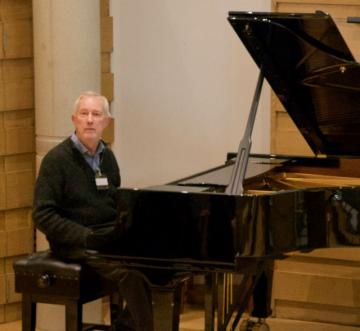Events
The Digital Libraries for Musicology (DLfM) workshop presents a venue specifically for those working on, and with, Digital Library systems and content in the domain of music and musicology. Running annually since 2014, it was set up and initially co-chaired by Kevin Page and Ben Fields, with papers on a wide variety of topics published in the proceedings of ACM ICPS. Truly international in scope, it has run in the USA, the UK and China, being hosted by The Avery Fisher Center for Music and Media at New York University in 2016, and the Shanghai Conservatory of Music in 2017.
Reports of individual workshops are available for 2014, 2016 and 2017.
Transforming Musicology contributors: Kevin Page (Co-chair 2014-2016, Chair 2017), Ben Fields (Co-chair 2014-2016), Richard Lewis (Proceedings Chair 2015-2016), David Lewis (Proceedings Chair 2017).
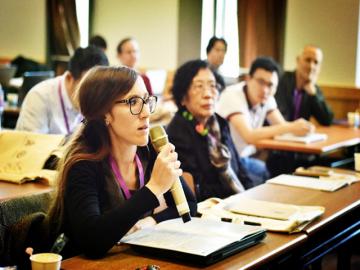
The annual Digital Humanities at Oxford Summer School offers training to anyone with an interest in the Digital Humanities, including academics at all career stages, students, project managers, and people who work in IT, libraries, and cultural heritage. Delegates choose one of several parallel workshops running throughout the week, supplementing their training with expert guest lectures.
Since 2015, Transforming Musicology have organised a Digital Musicology workshop within the summer school providing an introduction to computational and informatics methods that can be, and have been, successfully applied to musicology. Participants come from a range of career stages, disciplinary backgrounds and institutions, in a course that introduces working with as broad a set of tools and materials as possible.
The workshop comprises of a series of lectures and hands-on sessions, supplemented with reports from musicology research exemplars. Theoretical lectures are paired with practical sessions in which attendees are guided through their own exploration of the topics and tools covered. Laptops are loaned to participants with the appropriate specialised software installed and preconfigured.
A report on the 2016 workshop can be read on our blog.
We are indebted to contributing speakers and tutors from beyond Ttransforming Musicology without whom the workshop would not have been possible.
Transforming Musicology contributors: Kevin Page (workshop convener and course leader 2015-17). Tutors: Tim Crawford (2015-17), Rachel Cowgill (2015-16), Ben Fields (2015-16), David Lewis (2015-17), Richard Lewis (2015-16), David De Roure (2015-16), Christophe Rhodes (2015), Carolin Rindfleisch (2015-16).
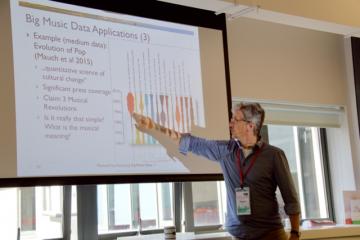
In November 2014, we staged the Hearing Wagner event at the Birmingham Hippodrome, to talk to members of the public about our work on Wagner perception. A week before this, project members had been recording live biometric data from audience members during the complete performance of Richard Wagner’s Der Ring Des Nibelungen by the Mariinsky Opera under Gergiev, also at the Hippodrome.
The event itself was hosted by Sir Colin Blakemore, and the Transforming Musicology team were also joined by Gary Kahn, editor of the English National Opera’s series of Opera Guides.
The event was part of Being Human, a festival of the humanities.
Transforming Musicology contributors: David Baker, Tim Crawford, Ben Fields, Richard Lewis, Daniel Müllensiefen, Terhi Nurmikko-Fuller, Kevin Page, Christophe Rhodes.
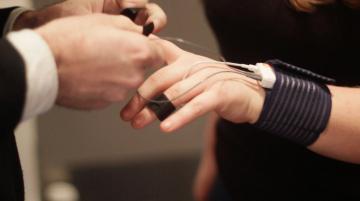
The ISMIR (International Society for Music Information Retrieval) conference has runs a tutorials track, for current topics in MIR. In 2015, we ran a half-day tutorial, informed by our experiences running the summer school, called Addressing the Music Information Needs of Musicologists. Presenting a musicologist-centred view of MIR, presentations covered metadata, networks, real-time performance annotation, recordings and scores.
Slides are available online, and there is a blog post describing the event.
Transforming Musicology contributors: Tim Crawford, Ben Fields, Justin Gagen, David Lewis, Richard Lewis, Kevin Page, Christophe Rhodes.
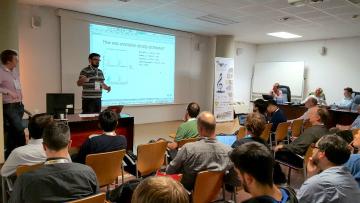
David Weigl and Kevin Page presenting.
Ada Lovelace's significant contributions were celebrated and discussed at the Ada Lovelace Symposium in 2015 to mark the bicentennial of her birth on 10th December 1815. On 30th November we explored mathematics, computation, and music
through a performance of Ada sketches, a short operatic work by composed by Emily Howard and part of her Lovelace Trilogy. More than a performance, this event with Emily Howard and musicians from the Royal Northern College
of Music involved mathematical explanation and engaged the audience in composition, turning numbers into notes. We revisited this work at the Ada Lovelace Symposium through an interactive display and a conversation on stage between
David De Roure and Emily Howard, herself a mathematician, computer scientist and musician. This also featured an extract of Howard's work Mesmerism, another part of the Trilogy, and illustrated numbers and notes by generating
a number sequence on a simulator of the Analytical Engine and developing the output as a musical theme—an exercise inspired by discussions at a music hack day held at Goldsmiths in October. The evening saw world premières of An algorithmic study on ADA and ADA, composed by James Whitbourn, performed by mixed-voice contemporary choir with violin and harp.
The event was supported by digital music research projects Transforming Musicology (AHRC, led by Goldsmiths, University of London) and FAST (EPSRC, led by Queen Mary University
of London), and organized at University of Oxford by a partnership of the e-Research Centre, Centre for Digital Scholarship, and The Oxford Research Centre for the Humanities, in collaboration with symposium organiser Prof Ursula
Martin, the Mathematical Institute, and Department of Computer Science. The performance was supported by the Northern Royal College of Music, Leverhulme Trust and University of Liverpool.
Transforming Musicology contributors: David De Roure
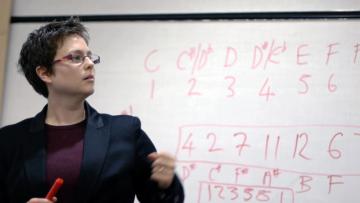
Emily Howard explaining 'numbers into notes'. Photograph by Angela Guyton.
In October 2015, we ran a two-day event at Goldsmiths – a workshop on Digital Approaches to Early Music, followed the next day by a hackathon in conjunction with the Semantic Media Semantic Linking of BBC Radio (SLoBR) project.
The workshop featured presentations by Frans Wiering, Katherine Butler, Laurent Pugin, Simon McVeigh and Tim Crawford, with time given over at the end for discussion, which ranged over topics such as the public release of research resources, issues of building new resources and going beyond digitisation, and raising the levels of digital literacy amongst musicologists.
The hackathon that followed had been widely advertised beyond the usual musicology and Music Information Retrieval circles and attracted a range of participants. We were lucky to be able to work with materials leant to us specially for the event by RILM, along with collections created within the project, such as the Early Music Online linked data catalogue.
Transforming Musicology contributors: Tim Crawford (workshop organiser); Kevin Page and Ben Fields (Hackathon organisers).
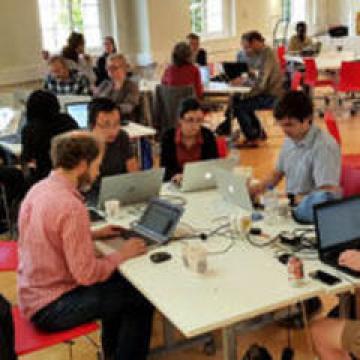
Music publishing and writing about music have always pushed at the boundaries of publishing technology, and the dissemination of music documents often challenges our notions of authorial ownership. As digital technology increasingly dominates the production and dissemination of scholarly content, including original writing, critical editions, and creative practice, how will music research rise to the challenges it poses?
This question was considered in a one day event in April 2016 that formed part of the Academic Book of the Future project and was co-organised by Transforming Musicology. The programme comprised six invited presentations and a roundtable discussion with a mixture of scholars, musicians, and library professionals. The Speakers were Rebecca Lyons, Mark Everist, Tim Crawford, John Baily, Laurent Pugin, Yun Fan (RILM) and Zoltán Kőmíves (Tido Music).

A one-day workshop in the final month of the project, and consisting of talks, panels and posters, the final event organised by the Transforming Musicology project focussed on the future. With talks by Michael Clarke, Roy Howat (pictured), Keiji Hirata, Laurent Pugin, Nick Collins, and Kevin Page and David Lewis, music ranging from Debussy and Jonathan Harvey to live coding, with discussion of future tools, directions and opportunities for education in musicology and digital technologies.
This event was hosted and supported by the Digital Research Cluster at Wolfson College.
Transforming Musicology contributors: Tim Crawford (workshop organiser and panel chair); David De Roure (Digital Research Cluster director), Kevin Page, Daniel Müllensiefen and David Lewis.
